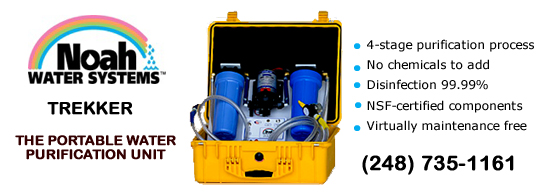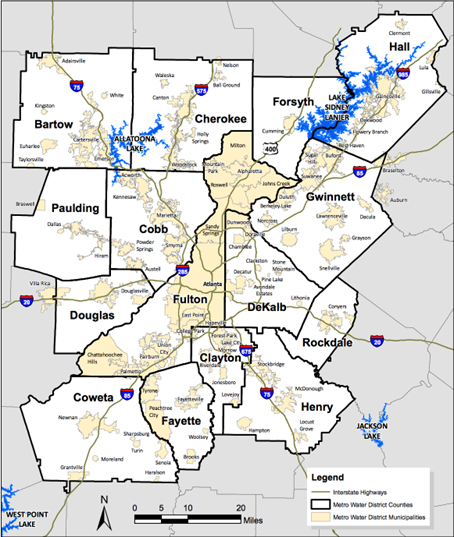Skinner: The Metropolitan North Georgia Water Planning District establishes strategies for water supply, conservation, watershed and wastewater management for 15 counties, 95 cities and 5.3 million people across the metropolitan Atlanta, GA region.
We are staffed by the Atlanta Regional Commission and work with our member communities to implement a regional water resource management plan that is enforced at the state level. The plan allows for comprehensive holistic water management while protecting water supply and water quality in the District.
WT: A holistic approach to water management is a rather unique perspective. Please elaborate.
Skinner: The Metro Water District’s Water Resource Management Plan integrates water supply and water conservation, wastewater management, and watershed protection into a single, integrated plan for our region.
It is updated every five years with input from local governments, water and wastewater utilities, and stakeholders.
The Metro Water District is the only major metro area in the country with over 100 jurisdictions implementing a long-term comprehensive water management plan and program that is required and enforced by the state.
WT: Please tell us about the conservation commitment.
Skinner: Because metro Atlanta sits at or near the headwaters of several distinct river basins and relies almost entirely on surface water, conservation of our water supply is critically important to the region.
Innovative as well as public education, have resulted in a 30% decrease in per capita water use since 2000.
WT: What have been the challenges your region has faced?
Skinner: There have been several challenges in the past two decades. The increased frequency and length of droughts have required greater efforts to educate the public about the importance of conservation to protect our limited supplies. We’ve also focused on informing the business and development communities in our region to help them understand their role in conserving water to support the economic prosperity of the metro Atlanta area. We continue to need business leaders to be champions of conservation to ensure our region has the water needed to support future growth, businesses and jobs.
We are also addressing flooding in our region in unique ways. For the first time ever, our plan will include a stormwater forecast to inform our current and future stormwater management decision-making for resilience, public safety and watershed health.
Getting all 55 water utilities on the same page and working collaboratively to manage regional resources has been a huge achievement.
WT: The Metropolitan North Georgia Water Planning District has recently been recognized for the fifth time with a Sustained Excellence Award. Congratulations! Can you tell us about the award and what your district has been recognized for.
Skinner: We received the award for a continued commitment to promoting the US EPA WaterSense program and water efficiency. WaterSense encompasses many different water conservation campaigns, like Fix a Leak Week in March, where we promote ways to find, fix and prevent leaks at home. The WaterSense program is great for us because it gives us a framework and national support for water conservation education, but it allows for creativity and implementation that makes sense for our goals and water education needs
WT: What has this meant for your team?
Skinner: We are proud to be recognized with a sustained Excellence Award along with our friends and fellow Georgia Water Utilities -- Cobb County Water System and Athens-Clarke County Public Utilities Department. It’s an honor to be a part of a contingency from Georgia competing for a national award with utilities and organizations from places like California, Texas, and Nevada.
WT: What other awards have you received?
Skinner: This award is our fifth Sustained Excellence Award and an eighth consecutive award from US EPA for our commitment to WaterSense and water efficiency.
In recent years, we have also received the Metro Atlanta Chambers E3 Award and Southface’s Fulcrum Award for our water conservation planning efforts. Resolutions by the Georgia House and Senate have been passed in our honor and we have received one commendation from Georgia Governor Brian Kemp. This year we also received a fun “Best in Show” award for our booth at the Georgia Green Industry Association’s annual conference.
WT: Your department is Education and Awareness. This is wonderful that you are committed to outreach. What are your educational objectives and why is this such an important facet of the District?
Skinner: We are unique in that we aren’t a water provider, but rather a water planning agency. This means we do not directly provide water services to customers and water users in the Metro Water District. We do support 15 counties, 95 cities, and about 55 water utilities with critical planning and other resources to help manage the region’s water needs
For example, not all our member utilities have full-time staff dedicated to water education and outreach, while others have multiple full-time staff to support this important role in protecting limited water supplies. We provide a variety of resources, from technical documents for local governments and utilities to activities, lesson plans, and materials for educators and students.
WT: Why is this such an important aspect of The District?
Skinner: Our part of Georgia receives an average of 50 inches of rain per year. While this may sound like a lot, we rely almost entirely on surface water sources – lakes and rivers. Our region is also vulnerable to droughts and located near the headwaters of several major river basins, which means we must be of conscientious about the amount of water we consume. Water conservation is a critical part of our efforts to be good stewards of our water supply.
WT: What are some of your most unique projects?
Skinner: We promote several annual contests at various times of the year to involve the community and get them thinking about water.
In March, we host a t-shirt design contest for our Water Drop Dash 5K, which attracts over 700 runners each year and promotes awareness during the EPA’s Fix a Leak Week.
We also have an annual High School Video Contest, where high school students across the District are encouraged to create a 30-60 second PSA-style video on water conservation topics. The students can submit videos in English or Spanish.
We have a water-themed calendar for which we host a photography contest each year. Nature photographers send us photos of water, wildlife, natural spaces, and related images that were captured across the 15-county region.
Finally, we’ve been holding an annual Middle School Essay Contest for over 20 years. Sixth, seventh, and eighth grade students from across the region write a 300–500-word essay on a water conservation or water education topic. We choose a winner from each county and the City of Atlanta, then select one District-wide winner.
WT: What are the rewards of a career in the water industry?
Skinner: Working in the water industry and with the Metro Water District is incredibly rewarding. We saw during the pandemic how critical the water industry and those in water careers are here to keep us safe, healthy, and clean at home and work.
It’s a great feeling to be a part of something so important to our region. Everyone needs clean, safe water.
Water utilities are trying to attract the next generation of water workers. The Georgia Association of Water Professionals manages a program called H2Opportunity to provide Georgia residents of all ages and levels of educational achievement from GED to Ph.D. with a renewed understanding of water issues within our state and highlight the benefits of a job in the water industry.
There are many positive aspects to a career in the water industry such as job availability, job stability, health care and retirement benefits. We encourage people to learn more about a rewarding career in water here.
WT: And one last drop … something to really think about.
Skinner: Water is the one thing no one can live without. It’s critical for supporting public health and keeping our people, communities, and businesses thriving. As our region grows, it is more important than ever to responsibly manage our water resources.
Individuals can make a difference by making every drop count.
Businesses can make a difference by pledging to use water efficiently in their operations.
Teachers can make a difference by inspiring students to learn about water in our daily lives and potential careers in water.
We encourage residents across our region to ask themselves: “What would life be like without water? What can I do to make sure my drop counts?”
There are many simple ways to get started.




